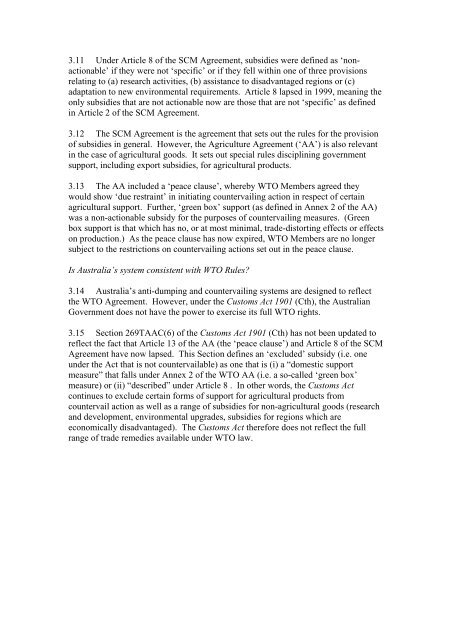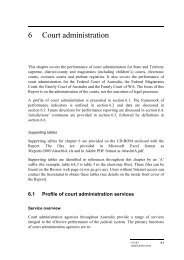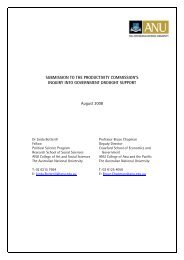Department of Foreign and Trade (PDF - 43 Kb) - Productivity ...
Department of Foreign and Trade (PDF - 43 Kb) - Productivity ...
Department of Foreign and Trade (PDF - 43 Kb) - Productivity ...
Create successful ePaper yourself
Turn your PDF publications into a flip-book with our unique Google optimized e-Paper software.
3.11 Under Article 8 <strong>of</strong> the SCM Agreement, subsidies were defined as ‘nonactionable’<br />
if they were not ‘specific’ or if they fell within one <strong>of</strong> three provisions<br />
relating to (a) research activities, (b) assistance to disadvantaged regions or (c)<br />
adaptation to new environmental requirements. Article 8 lapsed in 1999, meaning the<br />
only subsidies that are not actionable now are those that are not ‘specific’ as defined<br />
in Article 2 <strong>of</strong> the SCM Agreement.<br />
3.12 The SCM Agreement is the agreement that sets out the rules for the provision<br />
<strong>of</strong> subsidies in general. However, the Agriculture Agreement (‘AA’) is also relevant<br />
in the case <strong>of</strong> agricultural goods. It sets out special rules disciplining government<br />
support, including export subsidies, for agricultural products.<br />
3.13 The AA included a ‘peace clause’, whereby WTO Members agreed they<br />
would show ‘due restraint’ in initiating countervailing action in respect <strong>of</strong> certain<br />
agricultural support. Further, ‘green box’ support (as defined in Annex 2 <strong>of</strong> the AA)<br />
was a non-actionable subsidy for the purposes <strong>of</strong> countervailing measures. (Green<br />
box support is that which has no, or at most minimal, trade-distorting effects or effects<br />
on production.) As the peace clause has now expired, WTO Members are no longer<br />
subject to the restrictions on countervailing actions set out in the peace clause.<br />
Is Australia’s system consistent with WTO Rules?<br />
3.14 Australia’s anti-dumping <strong>and</strong> countervailing systems are designed to reflect<br />
the WTO Agreement. However, under the Customs Act 1901 (Cth), the Australian<br />
Government does not have the power to exercise its full WTO rights.<br />
3.15 Section 269TAAC(6) <strong>of</strong> the Customs Act 1901 (Cth) has not been updated to<br />
reflect the fact that Article 13 <strong>of</strong> the AA (the ‘peace clause’) <strong>and</strong> Article 8 <strong>of</strong> the SCM<br />
Agreement have now lapsed. This Section defines an ‘excluded’ subsidy (i.e. one<br />
under the Act that is not countervailable) as one that is (i) a “domestic support<br />
measure” that falls under Annex 2 <strong>of</strong> the WTO AA (i.e. a so-called ‘green box’<br />
measure) or (ii) “described” under Article 8 . In other words, the Customs Act<br />
continues to exclude certain forms <strong>of</strong> support for agricultural products from<br />
countervail action as well as a range <strong>of</strong> subsidies for non-agricultural goods (research<br />
<strong>and</strong> development, environmental upgrades, subsidies for regions which are<br />
economically disadvantaged). The Customs Act therefore does not reflect the full<br />
range <strong>of</strong> trade remedies available under WTO law.

















